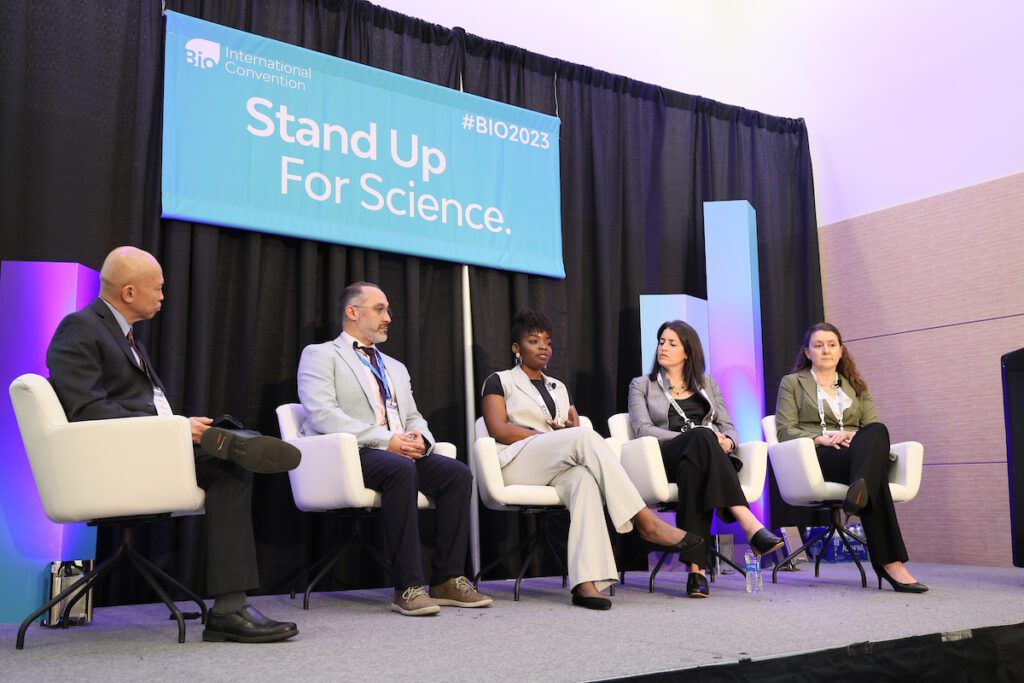The disease burden of RSV has been a tough problem for biotech R&D to solve for over 60 years. However, within the last year, the RSV vaccination landscape has changed completely thanks to decades of diligent work and groundbreaking science.
RSV is the leading cause of hospitalization in U.S. infants and a significant cause of hospitalization in 60 years and older, said Litjen Tan, Chief Strategy Officer of Immunize.org. He moderated a panel, Spotlight on Innovation: Conquering RSV Across the Life Course, at the 2023 BIO International Convention.
In fact, as Tan pointed out, 2–3% of U.S. infants will be hospitalized for RSV, and the hospital rate for infants five months or younger is 15.8 in 1000.
In seniors 60–79, the rate of hospitalization is .83 out of every 1000, while seniors 80 years and older saw rates of hospitalization at 2.6 out of every 1000. However, “RSV is not a nationally notifiable disease and it’s not routinely tested for in older adults coming in with respiratory symptoms,” noted Kena Swanson, Ph.D., Vice President of Viral Vaccines at Pfizer. “So these numbers are likely a gross underestimation of the overall disease burden in older adults.”
RSV has long been a problematic hospital burden—only made worse by the entry of COVID into the rate of hospitalization during the episeasonal disease cycle. Luckily, the breakthroughs being made by companies like GSK, Pfizer, Sanofi, and AstraZeneca are getting RSV vaccines on the market, meaning it might soon be reduced to a headache of the past.
The RSV vaccine landscape
Panelists from GSK, Pfizer, and Sanofi got into the nitty-gritty of vaccine development during the panel. The numbers are promising, both for vaccines that have been greenlit by the Food and Drug Administration (FDA), and those in the final stages of Phase 3 trials.
As we have reported, GSK’s Arexvy vaccine was the first RSV vaccine to receive FDA approval in May 2023 for individuals 60 and over.
“Among the [12,500] participants who have received Arexvy and the [12,500] participants who have received a placebo, the vaccine significantly reduced the risk of developing RSV-associated LRTD by 82.6% and reduced the risk of developing severe RSV-associated LRTD by 94.1%,” the FDA reported.
Second to be greenlit by the FDA was Pfizer’s Abrysvo vaccine, also for individuals 60 and over.
“The U.S. Centers for Disease Control and Prevention’s (CDC) Advisory Committee on Immunization Practices (ACIP) will meet on June 21, 2023, to discuss recommendations for the appropriate use of RSV vaccines in older adults,” Pfizer said. “Pending the outcome of this meeting, Pfizer anticipates supply availability in Q3 2023 ahead of the anticipated RSV season this fall.”
While vaccines for senior patients are becoming available, there is still a distinct need in the pediatric space, a need that Sanofi, partnering with AstraZeneca, hopes to fill.
Their RSV vaccine, Nirsevimab, “showed a 74.5% reduction in lower respiratory tract infections caused by RSV requiring medical care in healthy infants” and was “the first investigational immunization designed to protect all infants across the RSV season with a single dose,” according to a Sanofi press release.
How policy makes room for medicine
Asking the $64,000 question, “How do we ensure that this product, and frankly all the products that we’re here talking about will reach patients equitably?” Kate Mevis, Executive Director of U.S. Vaccine Policy at Merck, gave the policy-wonk perspective, discussing how drugs go from R&D to patients. (Merk has their own RSV vaccine in the pipeline, Clesrovimab.)
“You just heard from my fellow panelists about new immunizations that will make such a difference in the health and well-being of individuals across the globe,” said Mevis. “And these innovations represent decades of work by some of the smartest researchers, committed scientists, and driven medical professionals. But for these products to reach their full potential, they must reach the patients for whom they were intended, and that’s where policy comes into play.”
“The pandemic showed us that policies can work with innovation when there is both political will and public health urgency. But that change does not happen overnight and is not guaranteed to be equitable,” she continued. “We must be intentional to counteract the inequities that we know are baked into the existing system. And so with governments across the globe looking to put the pandemic behind them and return to what I would call business as usual, maintaining the Titan level of intentionality—and I should say urgency—will become harder and harder to come by.”
Luckily, as has been seen time and time again during the 2023 BIO Convention, the science is strong, the industry is focused, and policymakers are eager to bring innovative treatments to market—despite the barriers that still need to be overcome.




